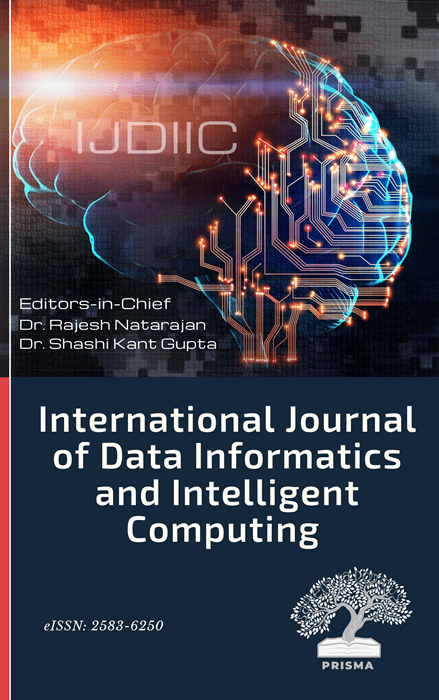Techniques of Machine Learning for Detecting Heart Failure
DOI:
https://doi.org/10.59461/ijdiic.v2i2.62Keywords:
Machine learning , Prediction , Heart failure , Random forestAbstract
Heart failure is a major health problem affecting millions of people worldwide. Early detection of heart failure is crucial to ensure timely treatment and reduce the risk of complications. Machine learning approaches have shown promise in detecting heart failure at an early stage. In this study, we aimed to develop a machine learning-based approach for early detection of heart failure using clinical and laboratory data collected from secondary data source in Kaggle. We used a supervised learning approach to develop a predictive model for heart failure. Six machine learning techniques, including logistic regression, decision trees, Random Forest, support vector machines, K-Nearest Neighbor, and Naive Bayes, had their performance evaluated. We have compared the performance of these algorithms to more well-known risk prediction models that only depend on demographic and medical information. Our results showed that the random forest algorithm had the best performance in detecting heart failure, with an accuracy of 86.23%, precision of 86.19%, recall of 86.23%, and F1 score 86.19%. In conclusion, our study demonstrated the potential of machine learning approaches for early detection of heart failure using clinical and laboratory data. The developed model has the potential to be used as a screening tool for early detection of heart failure, which could lead to improved outcomes for patients.
Downloads
References
Kerexeta, J., Artetxe, A., Escolar, V., Lozano, A., and Larburu, N. (2018). Predicting 30-day readmission in Heart Failure Using Machine Learning Techniques. Proceedings of the 11th International Joint Conference on Biomedical Engineering Systems and Technologies. https://doi.org/10.5220/0006542103080315
Shukla, A. K., & V. Suresh Kumar. (2023). Cloud computing with artificial intelligence techniques for effective disease detection. International Journal of Data Informatics and Intelligent Computing, 2(1), 32–41. https://doi.org/10.59461/ijdiic.v2i1.45
Tyagi, P., & S. K. Manju Bargavi. (2023). Using federated artificial intelligence system of intrusion detection for IOT healthcare system based on Blockchain. International Journal of Data Informatics and Intelligent Computing, 2(1), 1–10. https://doi.org/10.59461/ijdiic.v2i1.42
Natarajan, R., Lokesh, G. H., Flammini, F., Premkumar, A., Venkatesan, V. K., & Gupta, S. K. (2023). A novel framework on security and energy enhancement based on internet of medical things for healthcare 5.0. Infrastructures, 8(2), 22. https://doi.org/10.3390/infrastructures8020022
J., S. K., & S., G. (2019). Prediction of heart disease using machine learning algorithms. 2019 1st International Conference on Innovations in Information and Communication Technology (ICIICT). https://doi.org/10.1109/iciict1.2019.8741465
Li, J. P., Haq, A. U., Din, S. U., Khan, J., Khan, A., & Saboor, A. (2020). Heart disease identification method using machine learning classification in E-Healthcare. IEEE Access, 8, 107562–107582. https://doi.org/10.1109/access.2020.3001149
Diwakar, M., Tripathi, A., Joshi, K., Memoria, M., Singh, P., & kumar, N. (2021). Latest trends on heart disease prediction using machine learning and image fusion. Materials Today: Proceedings, 37, 3213–3218. https://doi.org/10.1016/j.matpr.2020.09.078
Heart disease prediction model using Deep LearningAlgorithms. (2021). Webology. https://doi.org/10.29121/web/v18i4/106
Atallah, R., & Al-Mousa, A. (2019). Heart disease detection using machine learning majority voting ensemble method. 2019 2nd International Conference on New Trends in Computing Sciences (ICTCS). https://doi.org/10.1109/ictcs.2019.8923053.
Ali, F., El-Sappagh, S., Islam, S. M. R., Kwak, D., Ali, A., Imran, M., & Kwak, K.-S. (2020). A smart healthcare monitoring system for heart disease prediction based on Ensemble Deep Learning and feature fusion. Information Fusion, 63, 208–222. https://doi.org/10.1016/j.inffus.2020.06.008.
Ghosh, P., Azam, S., Jonkman, M., Karim, A., Shamrat, F. M., Ignatious, E., Shultana, S., Beeravolu, A. R., & De Boer, F. (2021). Efficient prediction of cardiovascular disease using machine learning algorithms with relief and lasso feature selection techniques. IEEE Access, 9, 19304–19326. https://doi.org/10.1109/access.2021.3053759.
Mohan, S., Thirumalai, C., & Srivastava, G. (2019). Effective heart disease prediction using hybrid machine learning techniques. IEEE Access, 7, 81542–81554. https://doi.org/10.1109/access.2019.2923707.
Ishaq, A., Sadiq, S., Umer, M., Ullah, S., Mirjalili, S., Rupapara, V., & Nappi, M. (2021). Improving the prediction of heart failure patients’ survival using smote and effective data mining techniques. IEEE Access, 9, 39707–39716. https://doi.org/10.1109/access.2021.3064084.
Ahmed, H., Younis, E. M. G., Hendawi, A., & Ali, A. A. (2020). Heart disease identification from patients’ social posts, Machine Learning Solution on Spark. Future Generation Computer Systems, 111, 714–722. https://doi.org/10.1016/j.future.2019.09.056.
Maragatham, G., & Devi, S. (2019). Retracted article: LSTM model for prediction of heart failure in Big Data. Journal of Medical Systems, 43(5). https://doi.org/10.1007/s10916-019-1243-3.
Gupta, A., Kumar, R., Singh Arora, H., & Raman, B. (2020). MIFH: A machine intelligence framework for heart disease diagnosis. IEEE Access, 8, 14659–14674. https://doi.org/10.1109/access.2019.2962755.
Dass, A. K. (2023). Comparison of Heart Disease Prediction Using Different Machine Learning Algorithms. https://doi.org/10.21203/rs.3.rs-2550067/v1
Aditya, Lalit and Mantosh Kumar. (2020). Heart disease prediction and classification usingmachine learning algorithms optimized byparticle swarm optimization and ant colonyoptimization. International Journal for Modern Trends in Science and Technology, 6(12), 426–435. https://doi.org/10.46501/ijmtst061282.
Alotaibi, F. S. (2019). Implementation of machine learning model to predict heart failure disease. International Journal of Advanced Computer Science and Applications, 10(6). https://doi.org/10.14569/ijacsa.2019.0100637.
Latha, C. B., & Jeeva, S. C. (2019). Improving the accuracy of prediction of heart disease risk based on ensemble classification techniques. Informatics in Medicine Unlocked, 16, 100203. https://doi.org/10.1016/j.imu.2019.100203.
Jindal, H., Agrawal, S., Khera, R., Jain, R., & Nagrath, P. (2021). Heart disease prediction using machine learning algorithms. IOP Conference Series: Materials Science and Engineering, 1022(1), 012072. https://doi.org/10.1088/1757-899x/1022/1/012072
Downloads
Published
How to Cite
Issue
Section
License
Copyright (c) 2023 Kumar Mohan, Yousuf Fadhil Salim AL-Mamari, Mohammed Ahmed Mohammed AL-Najadi

This work is licensed under a Creative Commons Attribution-ShareAlike 4.0 International License.








